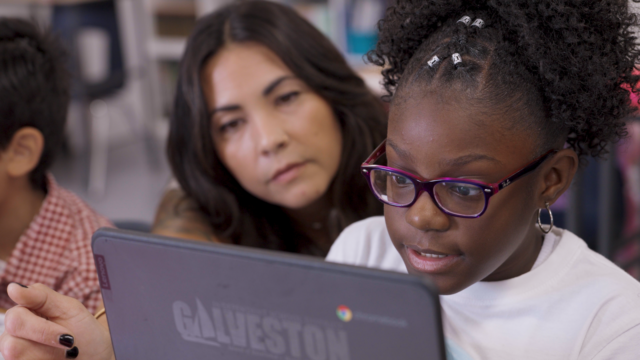
At HMH, we believe technology should be applied with purpose to deepen the human connections that accelerate learning outcomes.
We are now on the precipice of an exciting next chapter in the K–12 EdTech story. Generative AI (GenAI) language models are learning and evolving at an exponential rate. From learning a new language to planning your next family vacation, generative AI offers boundless opportunities, and there is no doubt it can play a critical role in K–12 learning—imagine the positive impact for educators, with new ways to develop dynamic lesson plans or assignments, an AI-powered assistant who can suggest new ways to differentiate instruction, and much more.
But this is a rapidly emerging landscape, and we also need to ensure the right safeguards are in place to protect students and teachers. It is critical that we balance our enthusiasm and passion with optimistic caution.
Educator Sentiment: Cautious Optimism
As it turns out, educators are feeling the same. Each year, HMH releases the Educator Confidence Report, a barometer for how educators are feeling about the state of their profession. We asked this year’s respondents (over 1,200 teachers and administrators) for their thoughts on generative AI, its potential and their usage.
We learned that while only 10% of educators used generative AI tools in their classrooms last year, those who did are clearly seeing the benefits—74% of this group expects their usage to increase in the 2023–24 school year. And what’s most exciting to me is that we see a huge jump in planned adoption for this coming school year, with 38% of all educators reporting that they expect to adopt AI tools.
Further, 57% agreed that GenAI is inevitable and should be harnessed positively in the classroom, with students taught to use the tools ethically. When asked which activities could most benefit from AI-generated content, 51% of educators said AI could support worksheet creation, 48% noted assistance with lesson plans, and 41% said ideating on writing prompts. 41% also agreed that AI tools had the potential to be used as personalized tutors for students.
Enthusiasm and curiosity are exciting, but educators need help. Less than 20% of educators say they feel equipped to use tools like ChatGPT in their classroom or school. More than half (58%) of educators noted that they would be interested in professional development and coaching around GenAI.
What’s Next?
I’ve spent a good portion of my career in education technology, and I can tell you that when approached the right way, EdTech can be transformative. Technology is a means to deepen student engagement and help deliver compelling learning experiences while also supporting teachers’ workflows. I see AI’s potential to contribute to three key areas:
- Give Teachers Time Back: The end goal for all of us is supporting student learning and nurturing positive outcomes, and we know that the student-teacher relationship is critical to this goal. GenAI-powered teaching assistants or planning tools can give teachers time back to do what only they can do, which is really connect with their students on a human level.
- Deeper Personalization for Students: K–12 classrooms are diverse in every possible way, and it has always been a challenge to create engaging personalized experiences when you have one educator for 25+ young learners. GenAI can help drive recommendations and supplement classroom time with additional practice and feedback. This might look like virtual teaching assistants who analyze student work and provide on-the-spot guidance or instant language translation for multilingual learners and other individualized supplemental supports.
- Better Insights Inform Better Action: Creating faster and more meaningful connections between assessment data and instruction, between how individual students are progressing and what they should work on next, or even deepening insight on district-wide trends earlier will support the build of more effective interventions and teacher experiences. GenAI can help us strengthen data collection, access greater insights, and inform more robust teacher and administration dashboards—and it can do all of this in a narrative, conversational, and digestible manner for educators rather than providing a list of numerical data that requires more work to translate into action.
This fall, teachers and students heading back to the classroom will begin to experience the benefits of generative AI first-hand through HMH’s connected literacy solution. As any teacher knows, providing comprehensive and skill-aligned feedback on student essays is critical to building strong writers, yet it is also time-consuming. Teachers often wish they had the time to offer more effective support throughout a student’s writing process rather than just at the end.
Writable, which operates within HMH’s platform, tackles this challenge with new generative AI-powered tools, including AI-generated prompts and assignments, AI-suggested feedback, and scores on any assignment. Educators using this tool in pilots last spring were excited about its potential to save them time and provide quality feedback in real-time. These new features increase the impact teachers can have by engaging more students with targeted feedback and motivating better writing in the moment. Teachers can decide which AI-generated feedback is applicable and choose whether to deliver it to students.
And this is just one example. As we embark upon another school year, I’m excited to see what other applications of generative AI make their way into the classroom and how teachers and students feel about the benefits.
I look forward to this time next year when we gain a new series of insights from teachers and administrators in what will be our 10th annual Educator Confidence Report results. Will that 10% of teachers already using GenAI tool tick way up? In what ways will GenAI continue to surprise us, and where can it help the most?
The future holds promise, but we have a lot of important work to do to balance innovation and safety, to ensure educational content is accurate and effective, and, most importantly, that students and teachers remain the priority focus. HMH is committed to being a trusted partner and guide as we explore this new frontier together.
***
HMH’s 9th annual Educator Confidence Report (ECR) will be released in three parts. Part 1, available now, will look at how educators nationwide view the teaching profession and generative AI. Look for Parts 2 and 3 in early fall. Download Part 1 now.
Discover best practices for integrating AI in the classroom.














